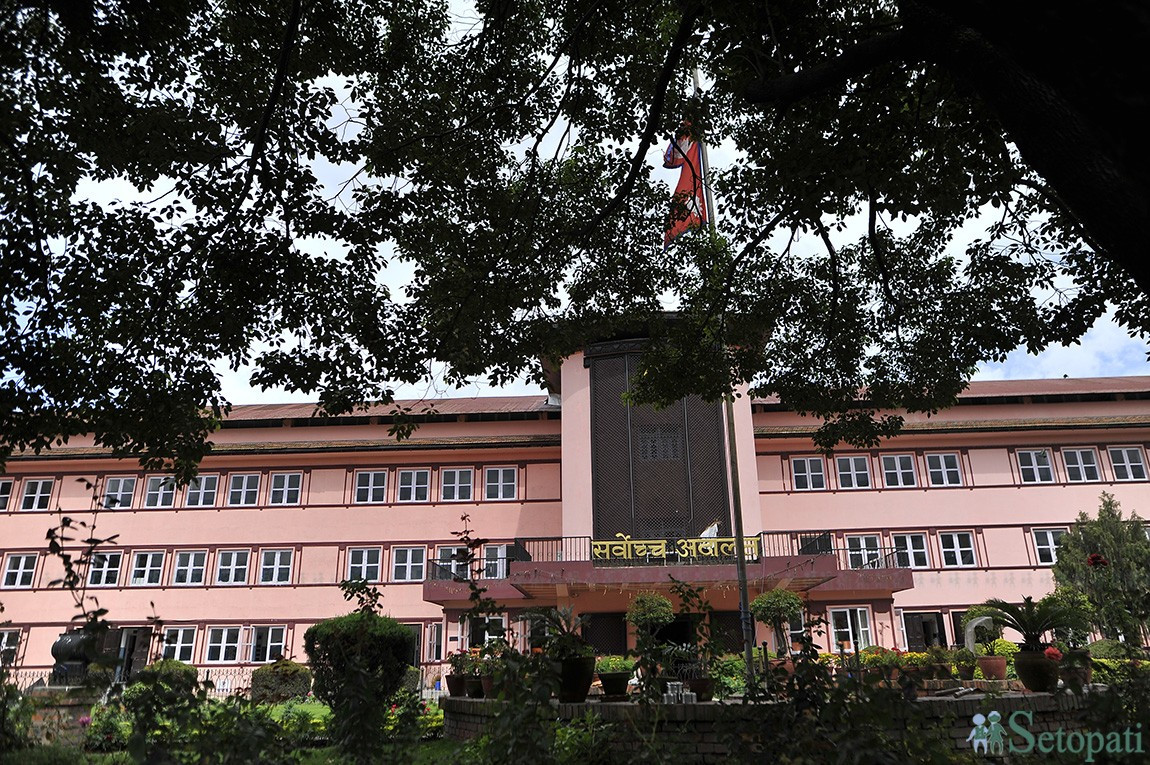The writ petition filed against the provincial government of Koshi will be heard by the full bench of the Supreme Court (SC).
The bench of Justices Sapana Pradhan Malla and Sushma Lata Mathema has ordered to send the case to the full bench for final hearing, according to senior advocate Tika Ram Bhattarai who was present during the hearing on Sunday.
The case was assigned to the bench of Justices Khatiwada and and Sushma Lata Mathema on Friday.
But Justice Khatiwada recused himself from the case pointing that he had issued an interim order in the previous hearing on the petition.
Former chief minister (CM) and CPN-UML Koshi parliamentary party leader Hikmat Kumar Karki had filed the petition against Koshi CM Uddhav Thapa.
The bench of Justice Khatiwada hearing the writ petition on August 24 had issued an interim order instructing the Koshi province government to not take decisions of long-term significance pointing CM Thapa cannot be deemed to have won the vote of confidence in a constitutional manner.
It had stated that the act of Thapa securing the vote of confidence seemed to be against Articles 168 (2) and 168 (4), and Article 186 of the Constitution, parliamentary practice, constitutional morality and principles propounded by the court.
Clause 2 of Article 168 about constitution of provincial council of ministers states, "In cases where no party has a clear majority in the Provincial Assembly pursuant to clause (1), the Chief of Province shall appoint as the Chief Minister a member of the Provincial Assembly who is able to command majority with the support of two or more parties representing to the Provincial Assembly.”
Similarly, Article 168 (4) says, "The Chief Minister appointed pursuant to clause (2) or (3) shall secure a vote of confidence from the Provincial Assembly within thirty days after the date of such appointment."
Article 186 of the Constitution about voting in the provincial assembly, meanwhile, states, "All questions submitted for a decision in the Provincial Assembly shall be decided by a majority vote of the members present and participate in voting. The member presiding over the meeting shall not have the right to vote. Provided that he or she may exercise his or her casting vote in the case of a tie."
The bench had also decided to hold a final hearing on the case on September 1.
Nepali Congress (NC) leader Thapa eventually passed the floor test on Monday following a series of maneuverings and counter-maneuverings by the ruling coalition and the opposition parties before the vote.
Thapa received 47 votes to secure a majority in the 93-strong provincial assembly while 30 lawmakers voted against his government.
NC lawmaker Israil Mansuri conducted the proceedings as the senior-most member in the absence of Deputy Speaker Srijana Danuwar, who was elected to the provincial assembly from CPN-UML. Danuwar flew to Kathmandu on Monday apparently to stop Thapa from securing a majority.
The opposition including UML and Rastriya Prajatantra Party wanted a ruling lawmaker to chair the proceedings to stop the person on the chair from voting in support of the Thapa government.
That, however, was not to be as Mansuri also voted to help Thapa pass the floor test even as the opposition lawmakers protested.
The opposition parties have been claiming that any person chairing proceedings cannot vote in a floor test pointing at Article 186 of the Constitution.
The ruling coalition, on the other hand, has been claiming that Mansuri, chairing the proceedings in the absence of speaker and deputy speaker, can vote according to another provision in the Constitution.
Article 187 (2) states, "Subject to this Constitution, the Provincial Assembly shall have full power to regulate and decide its internal business and it shall be the exclusive right of the Provincial Assembly to decide whether or not any of its proceedings is regular or irregular. No question shall be raised in any court in this regard."
The ruling coalition had forced the hands of the opposition leading to Danuwar avoiding the meeting that she had called by asking Baburam Gautam, elected from Maoist Center, to resign as speaker.
Gautam was then inducted in the Thapa Cabinet.
Thapa was appointed Koshi CM for the second time by Province Chief Parshuram Khapung on August 1.
Thapa had staked claim for the post of CM with the support of 29 lawmakers from Nepali Congress, 13 from CPN (Maoist Center), four from CPN (Unified Socialist) and one from Janata Samajwadi Party.
Thapa had earlier been removed after just 22 days in office after the Supreme Court on July 27 revoked his previous appointment as chief minister deeming formation of the government headed by him unconstitutional.
Speaker of Koshi provincial assembly Baburam Gautam had also signed to support Thapa’s claim for the post of chief minister then.
The ruling coalition then asked Gautam to resign from speaker to ensure that it had 47 lawmakers required to form a majority government.

